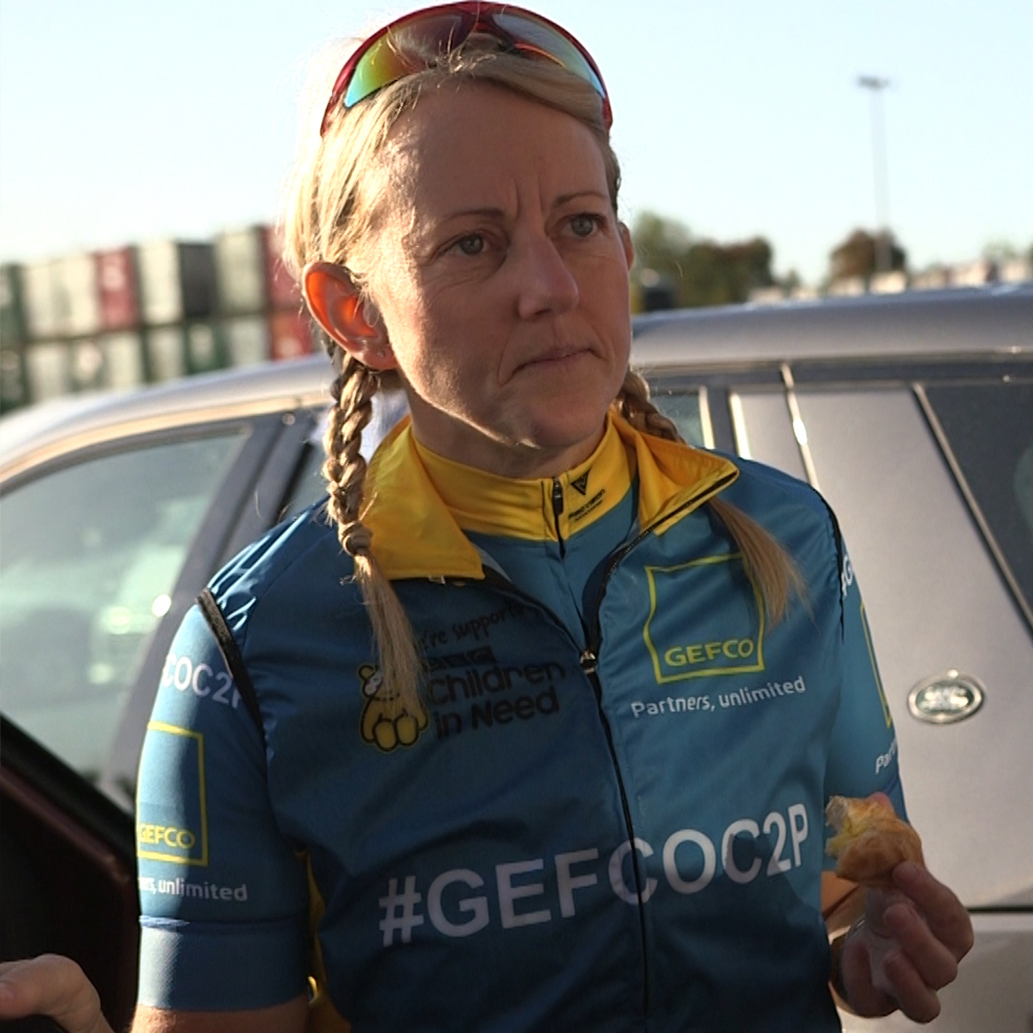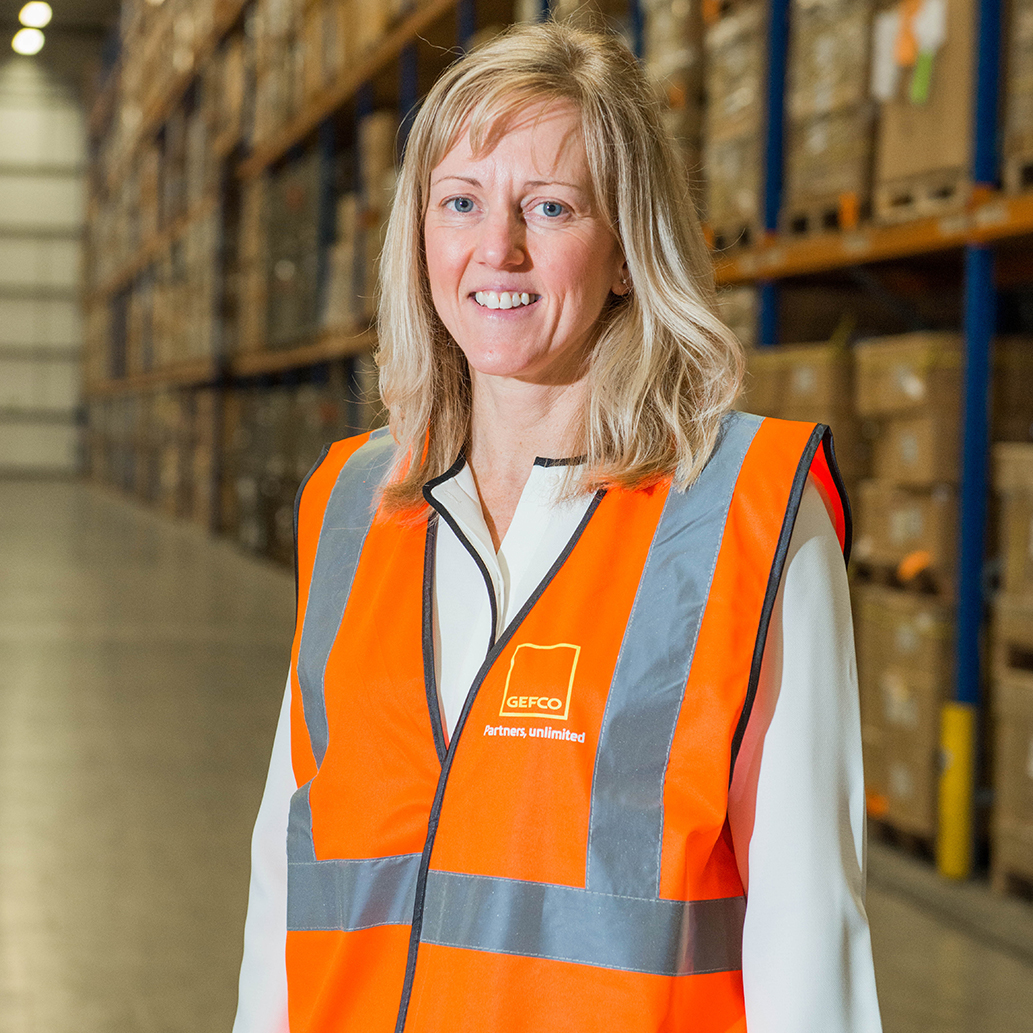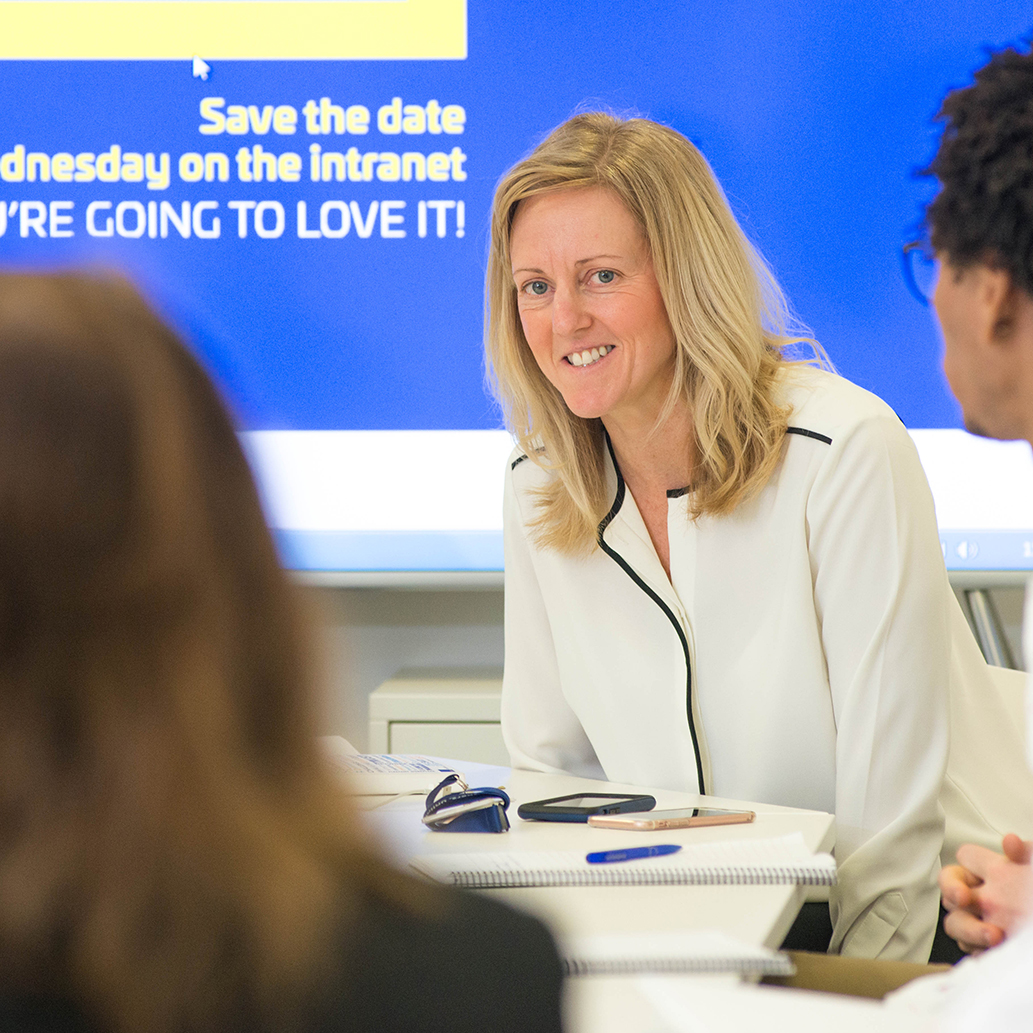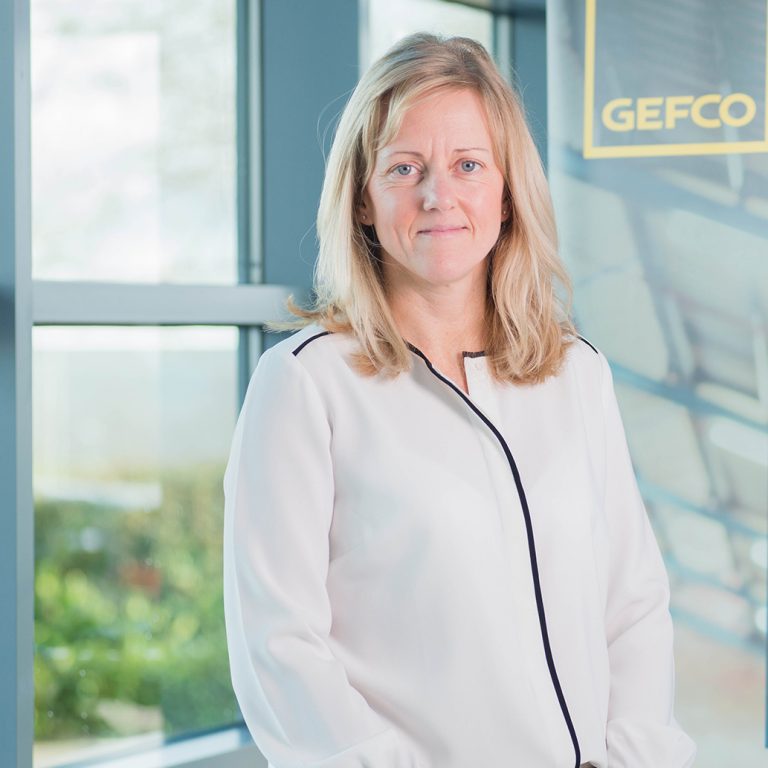Helen, take us back to your early life and how you found the path to a career in HR.
When I was young, living and growing up in Coventry, my dad worked at a local factory and he invariably went off in the morning hating work and came back in the evening complaining. I used to think “is that what work is all about?” It had quite an impact even at an early age and I was determined that it was not going to happen to me and I wanted to make a difference to how people felt about work. I thought, “there must be a way of working that’s rewarding and makes a difference?” Of course, at that time I had no idea what Human Resources was about, but a seed was definitely planted. So, when it came to choosing subjects for further education, I took a closer look and subsequently gained a place to study Labour Studies, HR and Industrial Relations at Warwick University. It doesn’t sound a laugh a minute, but I was hooked. I applied for some HR-related jobs and my first role was in training at Meggitt Petroleum Systems which was in the IT sector. I was also able to continue studying so I went on to study for my fellowship with CIPD, again at Warwick. I further went on to work for Checkmate Management a very fastmoving, international and rapid growth business in the eye of the dotcom bubble, but it was just what I needed. I was quickly thrust in front of groups of disinterested tele workers to deliver the latest training in customer relations for busy and burgeoning call centres. I remember feeling understandably nervous, but it was great experience and a real confidence builder. Plus, I was often called in to assist with more general HR-related areas so really, career-wise, the die was cast.

Fundamentally, what do you think it was about HR that so appealed?
It must have been a combination of things, but definitely memories of my dad at the factory – workers versus ‘the management’, invariably combative. Unions have their role to play, of course, but with HR, it’s an interesting position – it’s not a case of taking sides, it’s more about stopping the ripples turning into waves and providing the enablers, the support and the solutions to maintain balance. There are many different levers to pull to achieve this and that’s the aspect of the profession that I will never grow tired of. Sure, critics of the HR profession say we’ve splinters in our backsides from all the fence sitting, but I totally disagree, holding that position is essential and good HR is absolutely at the heart of a successful business.
It seems HR has been this advocate of emotional intelligence and empathy – much to the chagrin of the all-for-profit brigade – and taken a lot of stick for it. Then we’re all plunged into a tragic crisis and finally, the penny drops. If not empathy now, when?
It would be churlish to say that HR is a calling – you cannot compare to what we’re seeing on the evening news – but in my experience, most people in HR have that innate ability for compassion, to not treat people as obstacles in the way of progress. That’s what is at the heart of great HR, to support and engage on every level – not just the business imperative – and that’s what makes it such an absorbing role. So, these early experiences were a real grounding and it was very much in the transition stages, where HR was moving from paper-chasing grunt work towards increasing computerisation and data-driven strategy. I immediately understood the many benefits that this presented and witnessed how HR departments were beginning to split, with the old manual day-to-day aspects representing the past and data and analytics the future. Consequently, I started to gravitate towards more management information roles, at first with E.ON, in performance and talent management and a brief time as Head of Workforce Performance in the NHS. In these roles, it was clear to me that the answers and solutions lay in the data – what was needed was the capacity to extract it and put it to good use and that’s something that HR has been pilloried for to this day. I wonder how that has happened? I’ve always been very passionate about data – I can clear a room at a party in seconds – but seriously, when I think about how reliant we are today on amazing data and predictive analytics, the profession cannot afford to lag behind the curve. You cannot keep up with the speed of change, dragging this anchor.

Tell us about your next career move to National Grid.
After the NHS, I worked with a company called Crown Castle which was in the transmission sector – an industry that had already been through a sustained period of disruption – the business was acquired by National Grid and I was involved in many aspects of the project management, the TUPE and redundancies and dealing with the Monopolies Mergers Commission. I realised two important things, firstly; that this was the most intense and high level I had experienced and secondly, not only had I coped, I had thrived. As the dust settled, I took stock of my career and experience-set and was contemplating what the next stage in my career would be. I’d settled into a new role at National Grid – similar in terms of talent and career development – and I could easily have spent the next decade there in a relative comfort zone. But I came to the conclusion that it was time to move on, to pursue a more senior role in HR. The timing was right, as National Grid Wireless was in the process of moving down to Winchester – we lived in Warwick where my husband had a business – so it certainly seemed like a good time to make a move. I had been with the original company and the merger with National Grid for seven years and I learned so much about change management, managing disruption and M&As – not to mention about myself and my capabilities – so I was determined to make the right move next.

Your last three roles were with the biggest employer in the world (NHS) and subsequently two big corporates, so what was it about GEFCO that caught your eye?
I had reached a point in my career where I was looking for a business where I could really have an impact and that was something that I knew a big corporate could not provide. Another consideration is that you can be pigeonholed in big businesses for a certain type of role, there is often a real lack of career agility. But I confess that, I did think it could be perceived as a change of pace at first and I didn’t want to be accepted on the basis of the big names on my CV. As it turned out, it was clear that there was only a limited HR capacity in the business, no HR Director and a whole hill of HR work to do, to prepare to meet the challenges that the company was setting itself. Suddenly, all my initial misconceptions disappeared… I really wanted to join this company in a way that I had never felt before and, who knows, perhaps all the experience that I’d gained would make the difference. From a personal perspective, I had spent most of my career as a specialist, whether that was in training, performance or career development and GEFCO presented a really rare opportunity. It was a well-established company looking for some important and significant HR pieces for the corporate puzzle and I really felt that the skills set and experience that I had accrued was going to be a good fit.
Tell us about GEFCO as a business.
GEFCO has been operating in the UK for over 35 years as part of a global integrated network. Our business is international, multimodal transport, freight forwarding and logistics solutions, which encompass the whole supply chain. Core capabilities include; logistics solutions that dovetail with a wide variety of global customers, supporting them with constantly changing supply chain demands and significant growth plans, both locally and internationally. The success of a business like this is heavily reliant on well-structured domestic coverage, strategically located international gateways and bilateral country-to-country links. We have a highly sophisticated cross-dock operation located in Coventry, regional overland platforms along with remote partner sites in the UK and Ireland that help us ensure a reliable and fast, local and international distribution service. We have four advanced warehousing facilities including our flagship Customs-approved, Coventry warehouse and our WDA approved temperature-controlled facility dedicated to freight forwarding activities for the Life Sciences & Healthcare industry near London Heathrow. Our purpose-built state-of-the-art sequencing warehouse facility in Halewood provides a range of storage, inbound sequencing and outbound transportation services. In the UK also there are four Finished Vehicle Logistics Centres in Corby, Sheerness, Sandtoft and Portbury. The dynamism of the business was obvious, but from an HR point of view, there was a lot work to be done.
What were your impressions of the company - from an HR analytical point of view - and how did you decide on the plan ahead?
On my first day – by complete coincidence – a new CEO for the UK, Zsolt Vecsera also started, so there was a buzz of anticipation. Zsolt was from GEFCO’s Hungarian HQ and, as we were both new, we had something in common and we started to gel very quickly and began work on building the leadership team without delay. As we surveyed the scene and pored over the engagement data, even at this early point it was clear that there were problems. It appeared that people didn’t feel that proud to work for the company and there was a lot of division across the business. In short, there was unhappiness and a lot of grievance and disciplinaries and my mind raced back to my dad and that factory. That was just surface issues, further scrutiny revealed problems with recruitment, high turnover – at odds with a sector renowned for long service – and there was also an outgoing Managing Director, so we rolled our sleeves up and got to work. I’ve never before appreciated how critical a close and understanding relationship with the CEO is for HR – I guess any senior practitioner would say that – but having the ear and trust at the top is critical to the people piece. We could not make the changes that were critical to outcome without that trust and mutual support. Next was to build up the HR team and our approach here really laid out the blueprint for how we’ve gone on to hire, onboard and develop right across the business since and is really making a positive impact. It’s about not being fixated by the highlights and stunning successes on a CV, but moreover looking for those innate capabilities in people and compassion and empathy, which are a key foundation in our company values. In all our endeavours, I cannot speak highly enough of the HR team, they’ve been absolutely fantastic, committed, driven, and most importantly, right behind me when the going inevitably gets tough on occasion and that’s always a good sign.
How is the logistics industry being impacted by artificial intelligence and robotics and how is HR going to adapt?
Massively, we are already discussing the implementation of robotics and VR in many different areas, such as training. Then of course there’s the rise of electric and driverless vehicles, which will be a critical conversation very soon. From an HR point of view, the implications are obvious and need planning for right now. But today, right across the operation from the drivers, their vehicles and loads in transit, to the warehouses and pickers, inevitably jobs are – and will continue – to change. Any business that fights against this tide is going to lose the battle, we need to be prepared and be the drivers of change, not the late adopters. That means upskilling and re-skilling within, working with business partners and working with Warwick Manufacturing Group in Warwick University, to predict how technology will continue to change our world, to provide us with precious time to plan and adapt. There is a note of caution in all this, from an HR perspective. Case in point, is recruitment and L&D, whereby digital platforms can do a lot of the running, but whilst AI can filter for the correct skills and qualification, what it still cannot do is advise, provide empathy, that innate ability as a human being for understanding and emotional intelligence. As yet, I’m not convinced this is something that can be picked up in a psychometric test, but that is not to say that they are not an increasingly sophisticated and enlightening science in HR. But if you rely too much on this you can end up with formulaic and even mediocre teams and a severe lack of diversity.
Tell us about the bike ride that GEFCO undertook for Children In Need.
There was a wave of interest to do something really meaningful for Children in Need, but usually when it comes down to it, words don’t always turn into actions. GEFCO’s HQ is in France so I had the idea to cycle from our UK base in Coventry to Paris. I didn’t think there would be much uptake… how wrong I was as the entire company got behind it. Training began and we had static bikes placed at our sites within the UK to help those enrolled to practice. We also had personal trainers helping the team with preparations before and during the ride. When the day came, fifty-two of us – alongside some of our suppliers and customers – set out from Coventry en route to Paris over a four-day period. Our team, which also included over 30 support volunteers, helped us along a tough 300 mile plus route. We wanted to give our staff a unique team building experience, one to remember and to be charitable at the same time with the money raised going to Children in Need. But it ended up being so much more than that. It galvanised the whole company behind a great cause – which saw us raise £50,000 – and has maintained a wave of goodwill since. It really was a whole company experience with people across the business, as well as some of the operators in our business. It was a moment to hold in mind for when we come out of the current crisis.
Indeed, and it’s around this point in the interview that I usually ask about forward planning, perhaps looking ahead five years. Brexit will have been a massive feature on your radar in logistics for the past few years. Now that seems insignificant as we come to terms with Covid-19.
Of course, the crisis we’re in now changes everything, but we have to remain focused and operational, because it’s taken as read that logistics must maintain operations to keep the supply chains flowing. First and foremost is the duty of care to staff health and wellbeing in the network and in transit around the world, as well as in warehouses and office staff keeping everything operational. But we have to plan ahead and be ready for the changes that Brexit will bring and we have to factor in the technology changes that will revolutionise the logistics sector. So, while it feels that life is on hold at the moment, we have to maintain momentum and look ahead, taking into consideration operational, customer needs, health, and safety and of course people and standards. It’s important to set your sights on goals and a long-term goal of ours was for GEFCO to be named as one of The Great Places to Work in the annual ranking. This years’ list has just been announced and we’re thrilled to be named as one of the top large companies to work for in the UK.
In terms of operations, we have to be forward-looking and pro-active and we’ve been working on a programme with Warwick Manufacturing Group. This connects manufacturers, supply chain partners and even some competitors to work cohesively towards overcoming the challenges ahead, whether that be the advent of electric vehicles, the changes and complications that Brexit will ultimately bring and of course the huge impacts unfolding as a result of Covid-19. Whatever the industry and in medicine and politics too, there is no doubt that science and technology, collaborative effort and knowledge sharing will win the day and I wonder and hope that although the tragedy is almost impossible to comprehend, the world could come out this crisis a better place. Technology is pointing towards solutions to challenges and here too, I think we could benefit from people having to embrace the potential. This completely unexpected disruption to our lives is forcing us to re-evaluate everything and the way we are now working and the dynamics of virtual meetings are proving invaluable for businesses. I really do think that this is going to throw the door open on AI, robotics and virtual reality which are target areas for us now as we look to align our operations to the future.
It seems constant change is, as the cliché goes “the new normal” and there seems to continuous disruption to smooth running.
The world is definitely more complicated and most of the changes you can plan and prepare for and some completely blindside you. But it seems that a part of our ongoing evolvement is the capacity to adapt to change and constantly innovate. As an HR practitioner, it is human endeavour and spirit that is infinitely compelling. Despite the current crisis, it’s an incredible time to be in the profession that I’m in HR. I can see how technology and human qualities are amalgamating into an irresistible force and the massive sea change in the realisation that we need to work with the planet and our environment is a moving narrative. I’m of the generation that, when I started work, there were no computers on people’s desks and firms really had little consideration for how they operated, in terms of the environment. So, in my career, the changes are incredible. Now we are entering unchartered territory with Covid-19 and how this will play out is impossible to guess.
The current crisis is certainly giving us pause for thought and a chance to focus on the important things in life.
Yes, there’s a palpable change in people, the way they are interacting with concern and compassion, it’s genuine and heartfelt. In normal time, there’s hardly a second to think, let alone take a moment to simply ask if somebody is OK. We watch the tragic outcomes with growing worry and sadness, but there is a sense of a shared experience and a combined responsibility to work towards a common goal and that is so compelling. This crisis is undeniably a trying time, but it is forcing out our humanity and that is a shining light in the dark.












